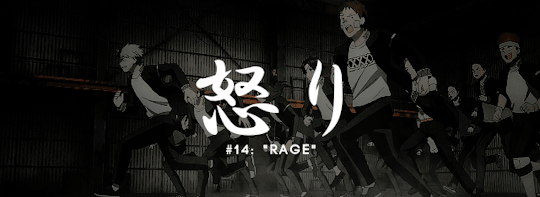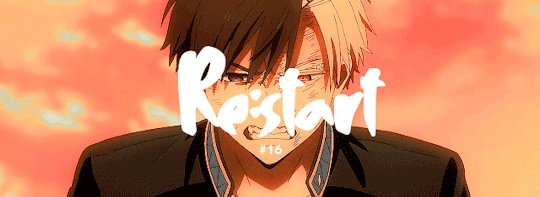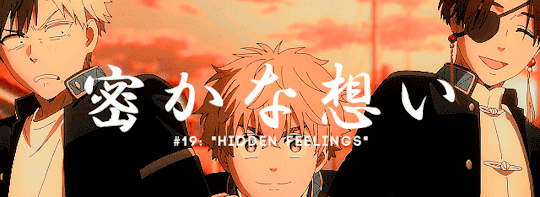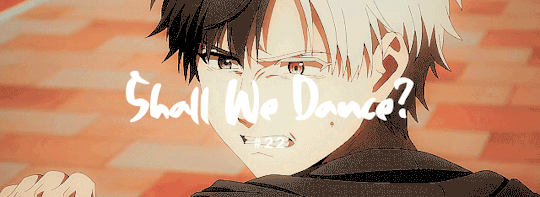makxmaa
4K posts
My Colorings / My Gfx / Akane-ba Analysis Call me Andre( ‾ʖ̫‾) Feel free to use my stuff ( ‾ʖ̫‾)
Last active 60 minutes ago
Don't wanna be here? Send us removal request.
Text
Akane-banashi Analysis: Rebellion, Art, and Humanity
I’ve been thinking about this since last week.
Hikaru and Karashi are basically the opposite of Akane now.

But before explaining why, let’s go back to who inspired the title of this analysis, and the character who also teaches us one of the most important themes in this manga and in art in general.
Kiroku is the opposite of his master: he’s a rebel. Miroku was someone deeply attached to the classics and the traditional ways of rakugo. Kiroku stood for everything opposite to that. His master hated the 'stains' that, according to him, ruined his pure and classical vision of rakugo. But Kiroku embraced imperfection because it brings out the most genuine side of a person.
When Kiroku says 'your art is your humanity,' he means that art — no matter what medium you use to express it — is a mix of many things: your age, your feelings at that moment, the context you live in, your personal experiences, and more.
Humanity, for Kiroku at that moment, showed itself in his free art, without the constraints of a script or traditional storytelling. But it also lived in the love his apprentices gave him—in the time they spent together playing guitar, spinning tops, eating yakisoba…



Instead than betraying himself and his humanity, Kiroku chooses to rebel against his master and gives his successor, Issho, a chance to shine. Before being expelled.
There’s also Taizen, who’s tormented by the idea that it was his fault his friend got expelled. Later on, his master threatens him to make sure Akane doesn’t get promoted
Thanks to Shinta, who talks to him, Taizen is able to free himself from his torment.
When Akane finishes her performance, it’s Taizen’s turn; at first, he hesitates, remembers what his master told him, and struggles, until he remembers Akane’s performance — genuine art full of humanity.


That pushes him to rebel and stay true to his own art
Another character who rebels is Maikeru, but unlike Kiroku and Taizen, who rebel against a figure of authority (their master), he rebels against himself and the audience.
Since his brother was expelled, Maikeru’s been carrying a pain he hides behind his cheerful, playful side. He can’t get past it and now he’s taken on the role of being the big brother for everyone. Ever since, he’s put others first, pushing his art and his own feelings aside just to give the audience what they want to see.
Until, during his exam, that changes: he rebels against himself and the audience. This is HIS story, nobody else’s. From it comes his humanity, the real feelings he’d been holding back all this time—the sadness for not going to his brother’s exam to support him, the sadness knowing he won’t step on stage again or learn more from him.



Let’s go back to Hikaru and KarashI. Both of them are rebels — they’ve gone against their parents, who are authority figures.
We can see how Karashi’s dad keeps calling him non-stop, after rejecting better opportunities, and how Karashi himself tells Hikaru that they’re the same — that they both made a stupid decision. Prioritizing work that truly fulfills them instead of a job that just gives them money and a comfortable life.

Hikaru rebelled against his mom, who just doesn’t get why he’s wasting his time on rakugo instead of focusing on his voice acting career.
They don’t just rebel against an authority figure—their parents—but also against the art of rakugo itself.
Let’s talk about Hikaru first. According to the critic himself, Hikaru’s rakugo completely breaks away from the traditional foundations of Edo-style rakugo.
As for Karashi’s art, although we haven’t yet seen how it has evolved, we can tell it’s still following the path of his first performance at the Karaku Cup. His most recent act was described as rakugo that’s anything but classical.


But what does that even matter? Who cares about being a “stain”? What really counts is being true to yourself, your art, and your humanity. All art changes, why would rakugo be any different?
Both Hikaru and Karashi follow Kiroku’s philosophy.
That’s why I say Akane is the opposite of Hikaru and Karashi, at least the Akane she is now.
Akane hasn’t rebelled against anyone because no one’s ever tried to hold her back from being herself. In fact, in her early days as a zenza, her story is all about searching for her identity, both as a rakugoka and as a person (her humanity).
At the Ikken competition, Akane hits her catharsis, where she finally steps out of her father’s shadow and becomes her true self.
Also, Shiguma, following his master’s example, gives his apprentices the freedom to be whatever kind of rakugoka they want. He even chooses tasks that fit their style and help highlight their strengths.
That’s why his apprentices are so diverse and different from each other, even from Shiguma himself. He doesn’t change who they are, but helps them shine in what they do best.

When Akane moves on from Shiguma and comes under Issho’s guidance, it’s the first time she faces a situation where her art—and her humanity—are at risk.
Voluntarily, and pushed by Issho, she starts losing her style, and with it, a key part of herself.
Unlike Shiguma, Issho doesn’t respect her individuality—he pushes her to move away from who she is and the art that’s truly hers.
On the other hand, Shōmei himself warns her: you will lose your freedom. She wouldn’t just lose a part of her art, but also a part of what makes it genuine.
And that’s the difference. Like Kiroku said, “If I betray my art, I betray my humanity.” But in Shōmei’s case, Akane isn’t betraying herself, since it’s a choice she’s made consciously.
When Akane interacts with Issho at the hospital, she sees him as a demon and is scared. Suenaga even uses the shinigami story to paint Issho like the real shinigami (in that story, if the shinigami stood in front of a sick person, they would be healed in the same position in which Issho was).Over time, she stops being scared, but she still holds some resentment toward him.
In fact, Issho doesn’t care about that resentment; he uses it to his advantage to keep Akane motivated, so she can achieve what he couldn’t: complete his master’s story.
Akane is now cornered. Issho is the only one who can help her reach her goal, even if it hurts her and she doesn’t want to accept it. She can’t rebel against him. Issho knows this very well, and that’s why he provokes her.
Akane has no choice but to sacrifice a part of her art, and with it, a bit of her humanity.
Like what happened recently, when Issho told her not to make the audience laugh—even though making people laugh is a core part of Akane’s art, and who she really is. Akane is happy, smiley, and funny. Taking that away from her is like taking away a big piece of her personality and who she is.
Moue and Suenaga do an amazing job capturing all of this on this double-page spread.
(Let’s analyze it a bit)

The first panel is a close-up of Issho, staring right at Akane, who’s sitting down — like she always does. Then there’s a panel that highlights a text box saying: “No laughing.” In the next panel, there’s a wide shot. Issho stands tall and imposing, creating a stark contrast with Akane. He dominates the scene, while Akane remains seated on the floor, clearly at a visual and emotional disadvantage.
Now let’s focus on the text box on the left.It’s placed right next to Akane and at her level;it extends beyond its panel and spills into the one below, where we see a super close-up of Akane looking shocked..This isn’t accidental: visually, it shows how Issho’s words — his order — invade Akane’s space, and symbolically, a part of her identity as rakugoka.
There is a moment when Issho, in a moment of honesty during an argument with Akane, says that his predecessor’s art was simply a coincidence between his nin and the standards he had.
Like I said before, Kiroku was a rebel who went against his own master; he was someone who stayed true to himself. I believe the main thing to master Shiguma’s art is to follow and understand the philosophy he lived by. hat’s why the current Shiguma was allowed to learn it.
I don’t think it’ll happen now, but I’m hoping a future Akane will rebel against Issho.
#The most dificult part of this whole analysis was choosing the titler#akane banashi#akanebanalysis#yapping as always
8 notes
·
View notes
Text
Chapter 199: Clear Skies After the Storm

I wasn't really expecting a backstory for Daiki, but I should have known better. I'm glad Unji and Raiya were there to be positive role models for him just when he's about to give up on life. You still have something to atone for, Daiki, don't die now! You can become a better person.

Daiki's pilot "experience" did come in handy though. Poor Seiko, she was about to pass out 😭 hang in there my goat. The entire Kito family got swallowed by a shark, including the worm. The Evil Eye came out and is causing some chaos. Meanwhile, Vamola just stayed in the same spot, plugging a hole in the plane lmao, good job girl. Let's head for Shimane!
12 notes
·
View notes
Text
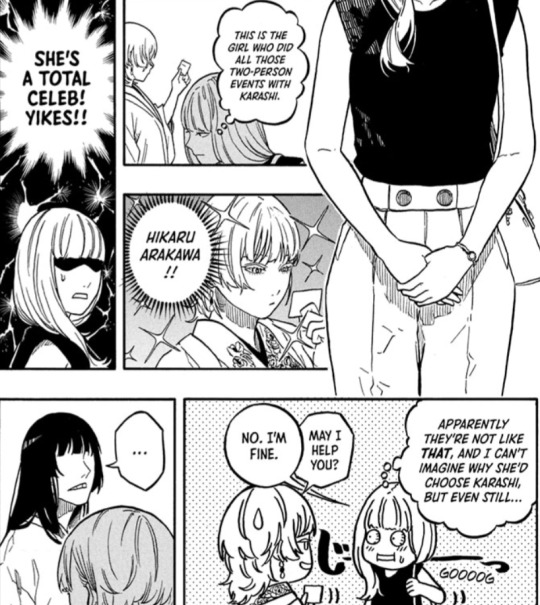

Girl, they don't want your man. They don't know why you want your man.
17 notes
·
View notes
Text
That moment when you’re almost done and suddenly lose all your motivation... Jdjdjdkjs
1 note
·
View note
Text
I'm writing an analysis of something I've been thinking about for like a week now I'm almost at 1k words (not much, but then I'm gonna have to translate it lmao)
1 note
·
View note
Text
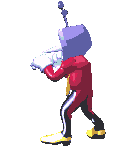
i can't get over this stupid fucking animation. i love how comically high the framerate is compared to all of his other animations. blud looks like he's boutta roundhouse kick silver the hedgehog
46K notes
·
View notes
Text

My honest reaction to the chapter is this page
41 notes
·
View notes
Text

This cracked me up, her friend’s practically collapsing and they’re over here like, Yippee!
18 notes
·
View notes
Text

I can't even write what this image made me feel, because it would violate the community guidelines.
#The chapter was actually really good#I swear. Just don’t judge me for... everything else#akane banashi
24 notes
·
View notes
Text
I just color manga panels and write as a way to deal with my anxiety. But sometimes what I post gives me anxiety too and I feel like deleting everything, lol. Honestly, I’ve come to the conclusion that I don’t even know if it’s good or not, lol. That’s why I think people who post stuff and don’t regret it or feel embarrassed are really brave
0 notes
Text
It annoys me when people act like they're better than others just because they analyze stuff. Like, calm down that doesn’t mean you understand the characters more than someone else.
Not everyone has to enjoy things the same way let people vibe how they want
This never happened to me on Tumblr, but I see it a lot on X (twitter).
0 notes






